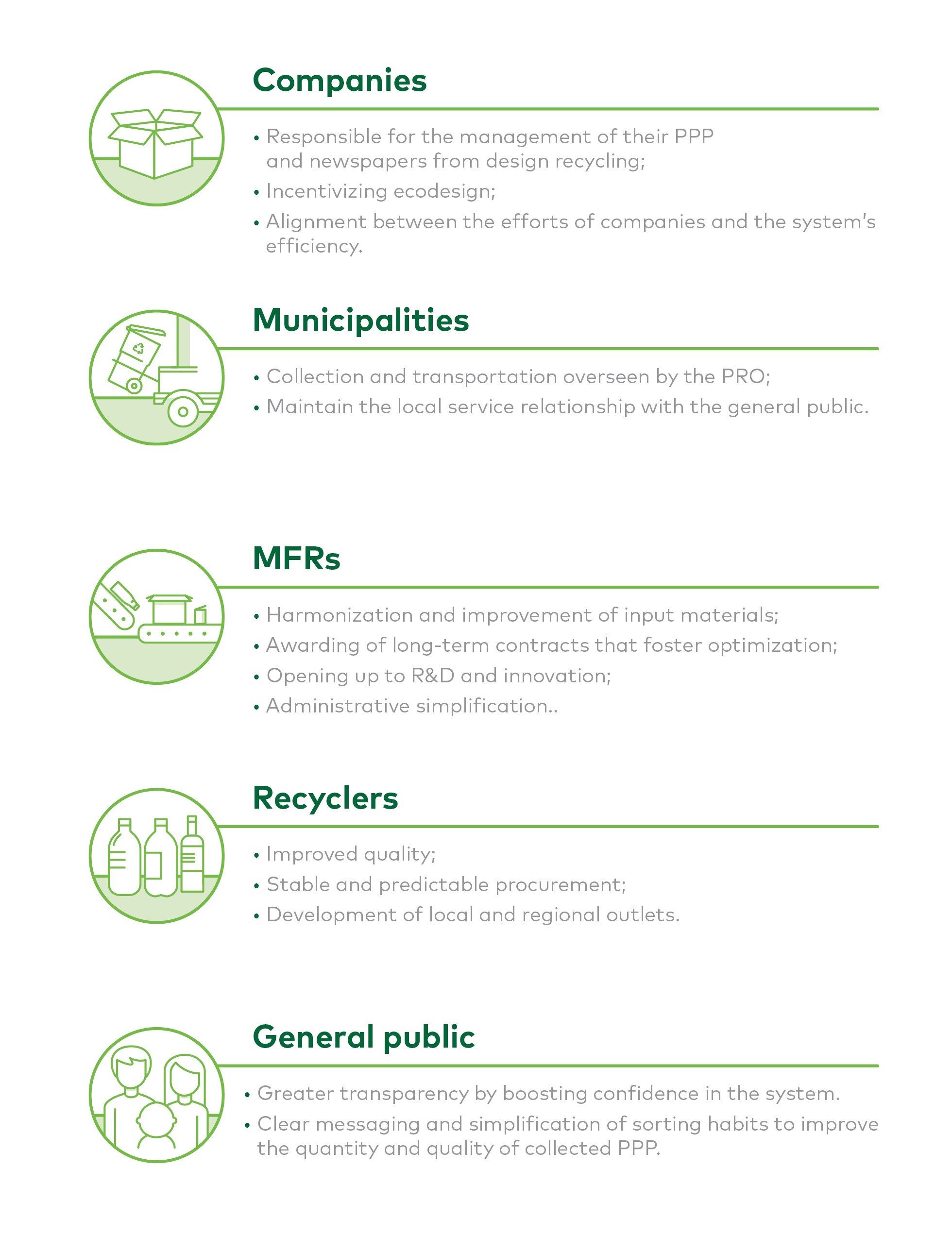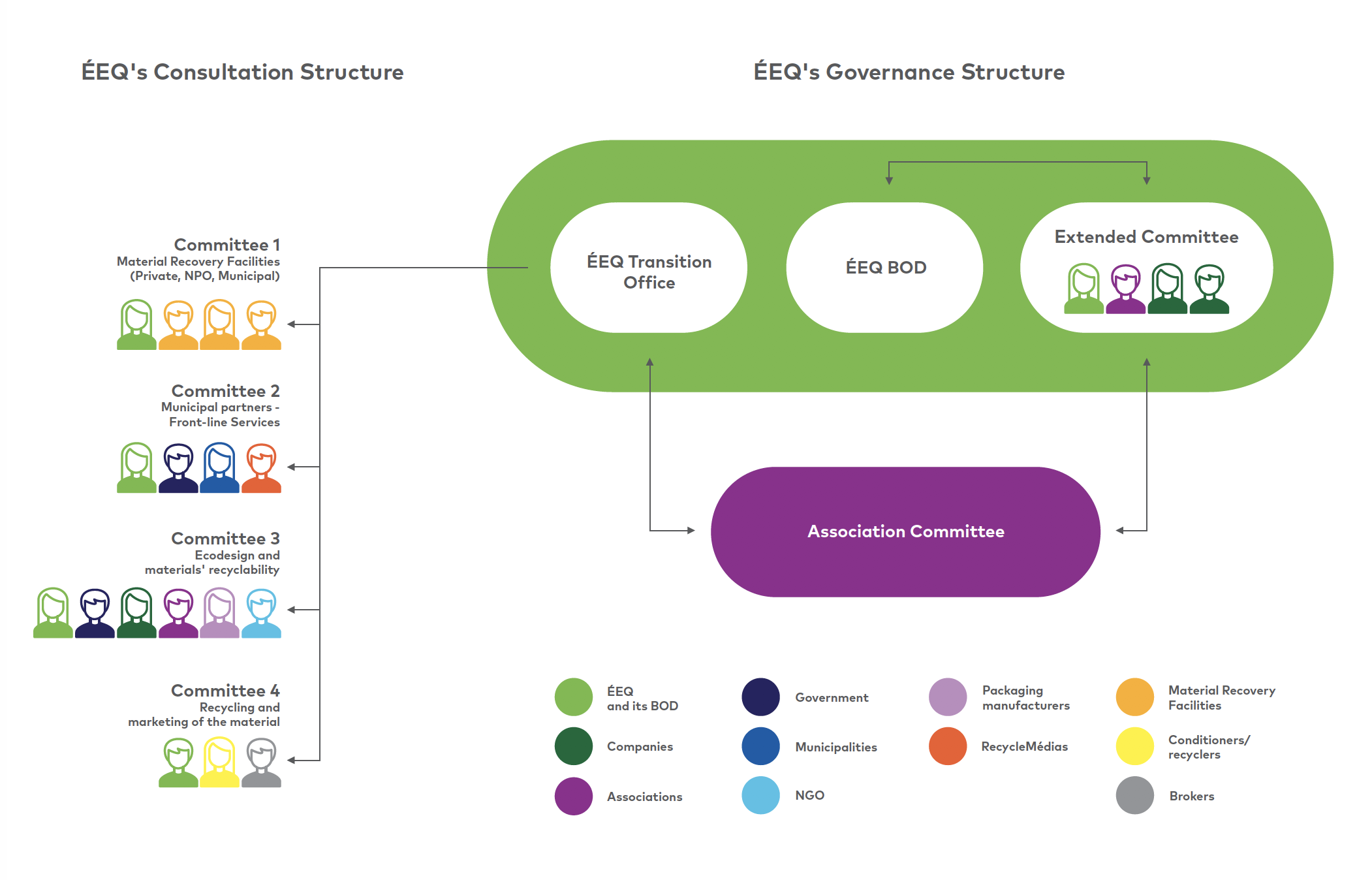The regulation on extended producer responsibility (EPR) for curbside recycling that took effect in July of 2022 has consolidated the modernization of the curbside recycling system in Quebec which has been in demand for a number of years. This regulation finally gives companies that supply containers, packaging and printed matter on the market, the producers, full control over the system they have been financing for more than 15 years.
Producers are now responsible for ensuring traceability, quality control over materials, and local and regional recycling. What better way to restore the confidence of citizens and businesses towards the recycling system in Quebec!
Understanding the modernization in 2 minutes!
Our current curbside recycling system
Companies, through ÉEQ, finance 100% of municipal collection services for recyclable materials, but don’t have a formal link with municipalities or any of the partners in the value chain.
The system lacks an integrated traceability and an overview of its management.
To this day, we have a fragmented silo system, despite the goodwill of the actors in the value chain.
Silo system
Why EPR curbside recycling?
Extended producer responsibility (EPR) is a principle by which a company that markets a product is responsible for its life cycle management until the post-consumption stage.
This responsibility encourages product manufacturing with a lessened environmental impact and easier recyclability and reusability.
EPR curbside recycling transfers the responsibility of collecting, sorting, recycling and communicating this service from local communities to producers.
The system moves from a public service to a business environment that enables the creation of a circular economy.
The producers are then responsible for the financing, performance and accessibility of the recovery and recycling system.
The EPR curbside recycling will give Quebec the opportunity to build a recyclable materials circular economy by allowing producers to:
- Oversee collection, transportation, sorting and processing of recyclable materials
- Integrate quality standards regarding collecting and sorting
- Ensure the traceability of materials and transparency of accounting
- Innovate and position curbside recycling as a true economic lever
Producers are members of the Designated Management Organization (DMO), who manages this responsibility on their behalf through value chain partner agreements to make the system work.
Éco Entreprises Québec submitted its application to be designated DMO on September 1st, 2022.
Élargissement progressif de la desserte

Transition towards a modernized system
A collective project spread over a 5 year period.
- July: the EPR curbside recycling regulation takes effect
- September: the application to become the DMO for curbside recycling in Quebec is submitted
- Before the end of October: the DMO is designated
- Fall: consultation committees are set up for implementation
- November and December: Data from municipal organizations and preliminary data from other players in the value chain is transferred to the DMO
- Discussions to enter into recycling and transportation contracts with municipal organizations are underway
- The transition plan for the end of the compensation plan and the start of EPR curbside recycling on December 31, 2024 is laid out
- Data from actors of the value chain is transferred
- Contractual agreements with conditioners and recyclers are drafted and concluded
- Mechanisms for communication, standardization, quality improvement and traceability of the materials are developed
- A binding contract between deposit systems and curbside recycling is concluded
- Indigenous communities who already benefit from a recycling and sorting service are progressively integrated into the new EPR system
- The first national education and awareness campaign to increase eco-friendly practices in Quebec is launched
- EPR curbside recycling is fully implemented
- Requirements for all producers of non-refundable containers, packaging and printed matter, including online businesses from websites with no physical presence in Quebec, are met
- Industries, commerces and institutions (ICI), including educational institutions, are covered
- On-trade services (for example: accomodation, food service industry, etc.) are covered
- Performance, traceability and local recycling goals are entered into force
- Ecodesign standards and a full eco-modulation of the fee structure for producers are implemented
The implementation of ERP : A win-win approach for all stakeholders

ÉEQ hard at work: our actions +
In order to track work and prepare for the transition to EPR curbside recycling, ÉEQ and its partners have developed a strong collaborative governance structure.

An Extended Committee that includes members from the ÉEQ Board, business associations and companies has been created by the board of directors. This committee is a meeting place for modernization work efforts underway.
The committee’s mandate includes:
- Understanding the regulatory framework and the responsibilities given to the DMO
- Following the main development and implementation milestones from the modernized curbside recycling system and their related indicators, and sharing recommendations with the board of directors
- Following projects that encourage the management of the transition between the compensation plan and the implementation of EPR
- Following, at a high level, the topics below and reporting to the board:
- The submitted conditions to promote a balance between marketed materials and outlets, including the access to materials for producers
- Work related to out-of-home and ICI services
- The coordination between the curbside recycling and deposit systems
The Association Committee, which brings together representatives from fifteen Quebec and pan-Canadian trade associations, also contributes to this major project and helps to ensure an exchange mechanism on all files related to the Compensation plan and the modernization of curbside recycling.
Formal exchange structure
The establishment of an inclusive consultation structure allows ÉEQ to take the lead in the continuity of discussions with the various stakeholders during the transition period.
4 consultation committees have been set up to this effect, to promote discussions and support working efforts:
- Material Recovery Facilities
- Municipal partners for front-line services
- Materials ecodesign and recyclability
- Recycling and marketing of the material.
Documentation and links
- Framework Partnering Agreement between ÉEQ and Signatory Bodies (English version of Entente-cadre de partenariat entre ÉEQ et les Organismes signataires)
- Formulaire préalable à l’annexe de personnalisation de l’entente (in French only)
- Tour guide du formulaire préalable aux annexes de personnalisation (video, in French only)
- Tableau comparatif de l’Entente-cadre de partenariat entre ÉEQ et les Organismes signataires (in French only)
- RECYC-QUÉBEC : Modernisation de la collecte sélective (in French only)
- Ministère de l’Environnement et de la Lutte aux changements climatiques: Modernization of Quebec’s deposit and selective collection system
- Ministère de l’Environnement et de la Lutte aux changements climatiques : Régime de compensation pour les services municipaux fournis en vue d’assurer la récupération et la valorisation des matières résiduelle (in French only)
- Final EPR regulation
- Système modernisé de la collecte sélective : comment s’y préparer (In French only)
